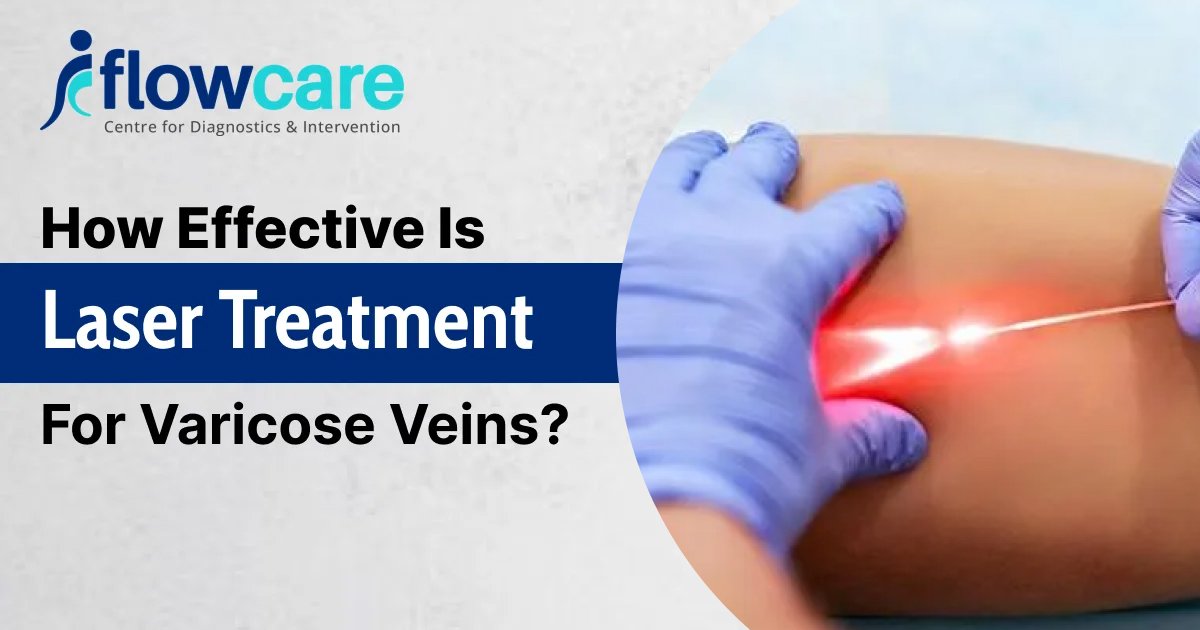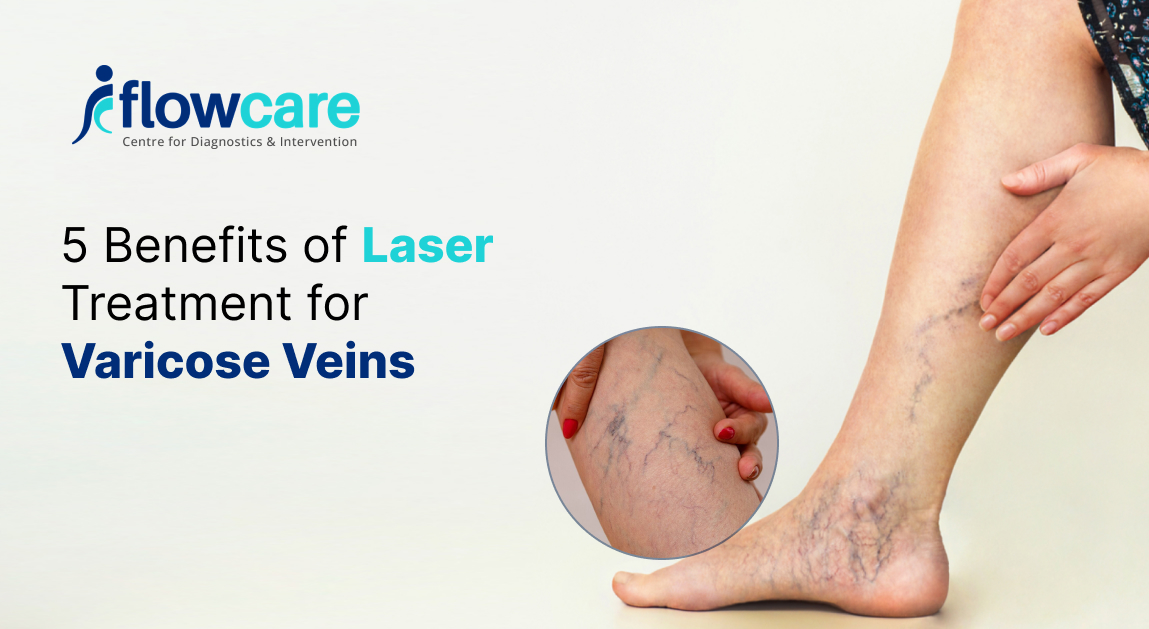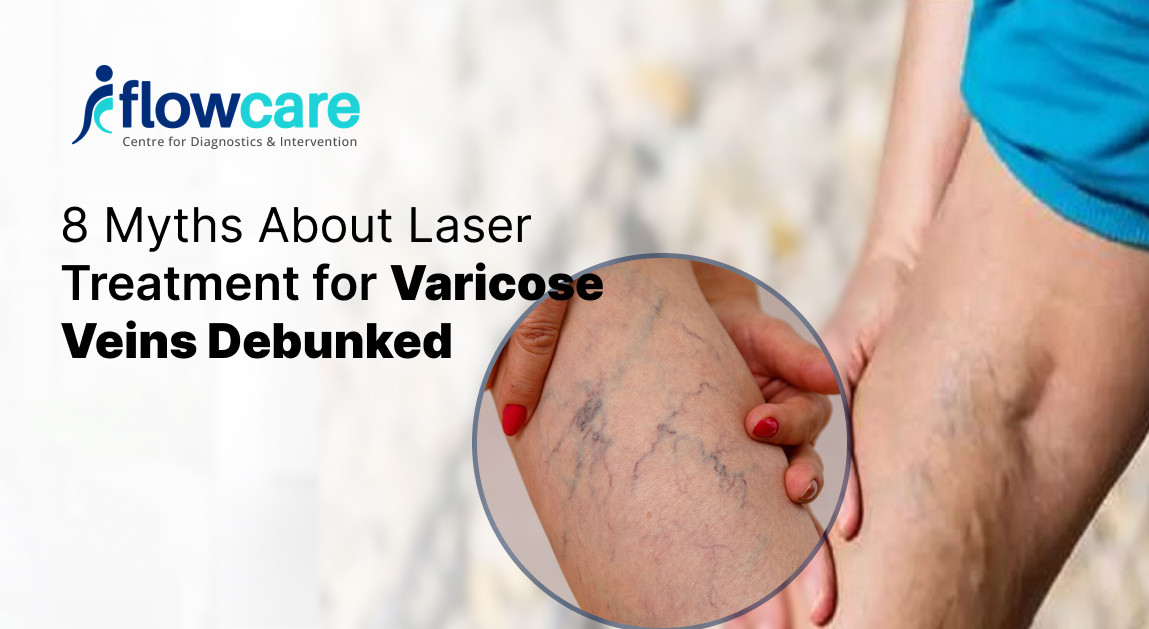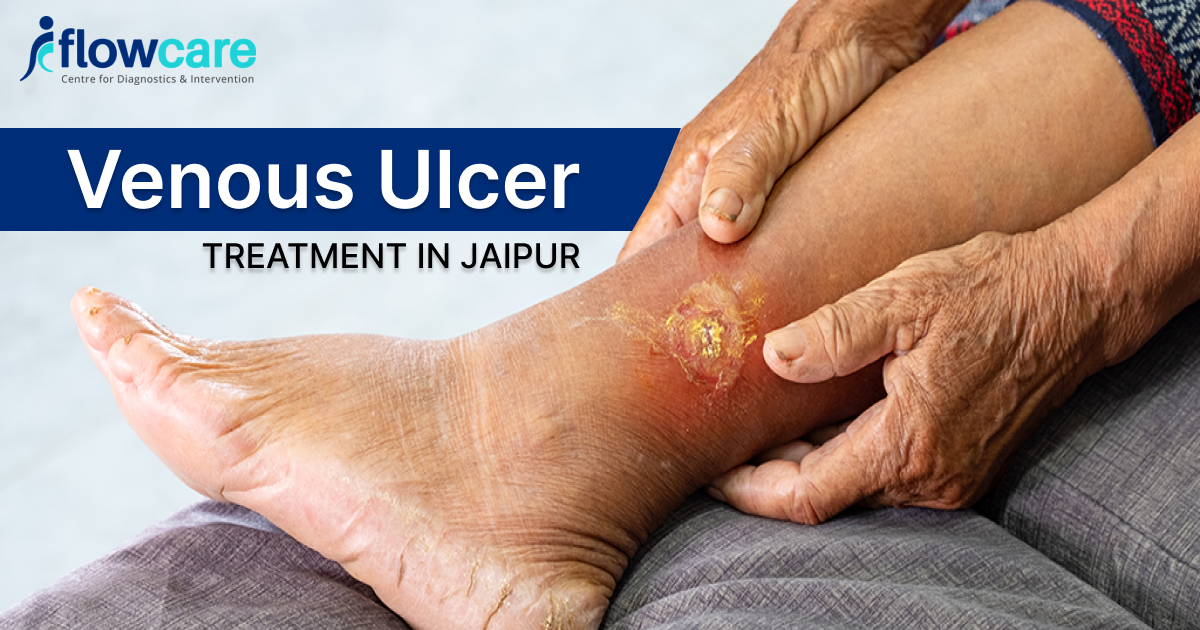
How Effective is Laser Treatment for Varicose Veins?
Laser treatment for varicose veins has been proven to be one of the best minimally invasive treatment options. According to a study, it has a success rate of 85-95%. (1)
Apart from this, 20% to 60%(2) of the population suffers from varicose veins, especially women, who are up to three times more at risk.
Even professionals like nurses face a 16%(3) risk, making laser therapy a trusted option across high-risk groups.
Introduction to Laser Treatment as a Modern Solution for Varicose Veins
Laser treatment for venous problems is now a modern, less invasive treatment approach that provides excellent results with minimal downtime.
Unlike traditional surgical procedures, laser treatment ensures a faster recovery, a high success rate, and less discomfort.
Procedures like Endovenous Laser Ablation (EVLA) use focused energy to seal off damaged veins, redirecting blood flow to healthier ones.
This article aims to answer a key question: How effective is laser treatment for varicose veins?
We’ll explore the success, benefits, and key considerations of laser treatment to help you decide if it’s the right option for varicose veins.
Understanding Varicose Veins
What are Varicose Veins?
Varicose veins, also known as varicosities, are swollen, twisted veins that develop when vein walls or valves become weak or damaged.
This causes blood to pool or flow backwards, a condition known as venous reflux.
This increases pressure inside the veins, making them swell and become visibly distorted.
Common risk factors include ageing, pregnancy, obesity, prolonged sitting or standing, inactivity, and family history.
Overview of Laser Treatment for Varicose Veins
Varicose veins have a new treatment method, which utilises a laser.
It provides great success rates, fewer downtimes, and better cosmetic results than the traditional surgical approach.
What is Laser Treatment for Varicose Veins?
Laser treatment uses focused light energy to heat and seal off abnormal or damaged veins.
The procedure is designed to close the affected vein, restoring blood flow to healthy veins and allowing the body to absorb the sealed vein over time naturally.
Types of Laser Treatments
1. Endovenous Laser Therapy (EVLT or EVLA)
- The most common and advanced type.
- Involves inserting a laser fibre directly into the diseased vein under ultrasound guidance.
- Used primarily for large veins like the great saphenous vein.
2. Simple (External) Laser Treatment
- A laser is applied to the surface of the skin.
- Ideal for small varicose or spider veins, especially on the face or legs.
- Usually requires multiple sessions.
Effectiveness of Laser Treatment for Varicose Veins
Laser treatment, particularly Endovenous Laser Ablation (EVLA), is now widely accepted as a first-line treatment for varicose veins.
It offers a high success rate, a minimally invasive nature, and a quick recovery. Let’s explore its efficacy in detail.
Success Rates of Laser Treatment
According to the studies, the success rate of Endovenous Laser Ablation (EVLA) for varicose veins is 92% (6).
This confirms EVLA is a highly effective treatment for incompetent great saphenous veins (GSVs), with increasing follow-up.
Improvement in Symptoms & Appearance
Laser treatment effectively addresses:
- Pain, swelling, and heaviness in the legs
- Skin changes (eczema, pigmentation)
- Cosmetic concerns from bulging veins
Patients report:
- Significant symptom relief within 1–2 weeks
- Visible reduction in varicosities and discolouration within 3–6 weeks
What is the Procedure Duration and Setting?
- Time required: Typically 30 to 60 minutes per leg.
- Anaesthesia: Local anaesthesia is used around the vein.
- Setting: Performed in a clinic or outpatient surgical centre.
- Recovery: Patients can usually walk immediately after the procedure and return to normal activities within 1–2 days.
- Post-procedure care: Compression stockings are recommended for a few days to support healing.
Comparison with Traditional Treatments
| Parameter | EVLA (Laser Treatment) | Surgical Stripping |
| Success Rate | 94–98% | 78–85% |
| Invasiveness | Minimally invasive | Invasive |
| Anesthesia | Local | General/spinal |
| Recovery Time | 1–2 days | 2–4 weeks |
| Recurrence | Low | Moderate |
| Post-procedure pain | Minimal | Mild to Moderate |
| Cosmetic outcome | Excellent | Variable |
What is the Cost of Laser Treatment for Varicose Veins?
The cost of laser treatment for varicose veins at FlowCare Clinic is Rs 50,000 per limb.
What are the Factors Influencing the Effectiveness of Laser Treatment?
1. Size and Location of Varicose Veins
- Larger or deeper veins may require more energy and careful technique to ensure complete closure.
- Twisted or tortuous veins can be harder to treat with laser and might need additional methods like phlebectomy.
- Veins closer to the skin carry a slightly higher risk of skin irritation, so energy delivery must be finely adjusted.
2. Patient’s Overall Health
- Conditions like diabetes, clotting disorders, or poor circulation can slow healing or increase the risk.
- Good vein health and vascular tone help improve outcomes and reduce complications.
3. Lifestyle Factors
- Obesity increases venous pressure and may raise the risk of recurrence.
- Prolonged standing or a sedentary lifestyle can worsen symptoms over time.
- Smoking can impair circulation and healing.
- Regular exercise and weight management support long-term results and healthier vein function.
Conclusion
Laser treatment, particularly Endovenous Laser Ablation (EVLA), is a highly effective, minimally invasive option for managing varicose veins.
It significantly improves symptoms like pain in leg, swelling, and heaviness, while offering excellent cosmetic results and a short recovery period.
The effectiveness of laser treatment can vary based on several factors, including the size and location of the vein, the patient’s overall health, and lifestyle habits.
Laser therapy delivers long-term relief with minimal risk when performed with proper technique and tailored to individual needs.
Consulting a qualified healthcare professional is essential before deciding on the treatment option.
FAQs
Is laser treatment good for varicose veins?
Yes, laser treatment for varicose veins is highly effective.
It is a minimally invasive procedure that offers excellent cosmetic results, and most patients can return to work or normal activities almost immediately after the treatment.
What are the drawbacks of laser therapy for Varicose Veins?
Common side effects include:
- Pain, bruising, and swelling are common side effects that usually resolve within a few weeks.
- Numbness or tingling (paresthesia): This can occur due to nerve irritation during the procedure and is often temporary.
- Redness or inflammation: The treated area may be red and inflamed initially.
What is the success rate of laser treatment for varicose veins?
According to the studies, the success rate of Endovenous Laser Ablation (EVLA) for varicose veins is 92% (7).
What is the recovery time after the laser treatment for varicose veins?
The recovery time is usually 1-2 days after the treatment. However, it depends from person to person.
Following the doctor’s advice, post-treatment is advised for faster and safer recovery.
How much does laser treatment for varicose veins cost?
At FlowCare, the cost of laser treatment for varicose veins is Rs 50,000/limb.






